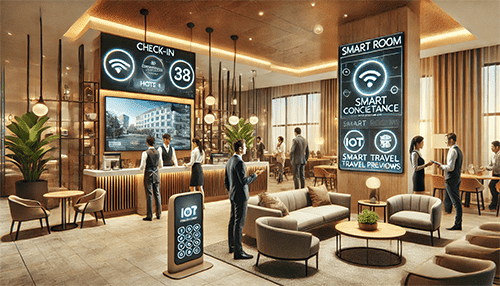5 Technology Trends Revolutionizing the Hotel and Tourism Industry
The hotel and tourism industry has always been about creating memorable experiences for travelers, but in recent years, technology has become an essential tool for enhancing those experiences. From personalized guest services to sustainable operations, technology trends are reshaping how hotels and tourism operators meet the needs of modern travelers. Here are five key technology trends that are transforming the hotel and tourism industry in 2024 and beyond.
1. Artificial Intelligence (AI) and Machine Learning for Personalization
Artificial Intelligence (AI) and Machine Learning (ML) are becoming indispensable in creating tailored experiences for guests. These technologies help hotels analyze guest data, such as past bookings, preferences, and feedback, to offer highly personalized services. For instance, AI-driven chatbots can provide 24/7 support by answering common questions, making recommendations, and even assisting in booking rooms or activities. Moreover, AI-powered tools like sentiment analysis allow hotels to gauge customer satisfaction levels by monitoring reviews and social media posts.
Machine learning models are also optimizing pricing strategies in the tourism industry. Hotels can now predict demand fluctuations and adjust room rates dynamically, which helps maximize revenue and occupancy rates. This trend towards personalization not only increases customer satisfaction but also drives guest loyalty, as travelers feel that their preferences are being valued and catered to uniquely.
2. Internet of Things (IoT) for Smart Rooms
The Internet of Things (IoT) is enabling hotels to create "smart rooms," where guests can control room settings with ease. IoT technology allows for the integration of connected devices, such as smart thermostats, lighting systems, and voice-activated assistants, which guests can operate using their smartphones or through voice commands.
For instance, a guest could use their smartphone to set room temperature, adjust lighting, or even order room service without leaving their bed. This technology also aids hotels in energy management by allowing them to monitor and adjust energy use based on occupancy, thus reducing energy waste and enhancing sustainability efforts. As sustainability becomes a priority for more travelers, IoT-driven smart rooms help hotels offer an eco-friendly experience without compromising comfort.
3. Contactless Technology for Enhanced Safety and Convenience
Contactless technology has gained immense popularity in the hospitality industry, particularly due to the COVID-19 pandemic. From contactless check-ins and check-outs to mobile payment systems, these technologies help reduce physical interactions while enhancing guest convenience. Many hotels now offer digital keys that allow guests to access their rooms through their smartphones, eliminating the need for physical key cards.
Contactless payment options, such as Apple Pay, Google Wallet, and QR code scanning, are also standard in many hotels and tourist attractions, allowing guests to make transactions swiftly and securely. This trend aligns with the growing expectation among travelers for seamless and safe experiences, where they can focus more on enjoying their stay rather than dealing with cumbersome processes.
4. Virtual Reality (VR) and Augmented Reality (AR) for Immersive Experiences
Virtual Reality (VR) and Augmented Reality (AR) have opened new avenues for immersive guest experiences, both before and during their stay. VR allows potential guests to "tour" a hotel or destination virtually before making a booking, offering a realistic preview of the property and its amenities. This capability can enhance customer confidence and drive bookings, as guests have a clearer picture of what to expect.
Augmented Reality, on the other hand, enriches on-site experiences by overlaying digital information on the physical environment. Some hotels and tourism sites provide AR-enabled maps or applications that offer interactive guides, historical information, or fun facts about a location. This is especially useful in large resorts or museums, where AR can transform self-guided tours into engaging and educational experiences.
5. Blockchain Technology for Secure Transactions and Transparency
Blockchain technology is bringing transparency, security, and trust to the hotel and tourism industry. With its decentralized and secure nature, blockchain offers a reliable platform for transactions, making it ideal for booking processes and payment security. Blockchain-based platforms are being used to prevent fraud and ensure that customer transactions are processed securely without intermediary interference.
Additionally, blockchain can play a significant role in loyalty programs. Traditional loyalty systems often require guests to navigate complex processes to redeem rewards. However, blockchain allows for more streamlined and transferable loyalty programs, enabling guests to easily earn and redeem points across multiple hotels and service providers. This flexibility boosts guest engagement and encourages loyalty by providing a seamless reward experience.
The Future of Technology in Hospitality
Technology trends like AI, IoT, contactless solutions, VR/AR, and blockchain are not only elevating guest experiences but are also helping hotel and tourism businesses operate more efficiently. By integrating these technologies, hotels can enhance guest satisfaction, drive revenue, and foster brand loyalty in a highly competitive market.
These trends reflect a broader shift towards convenience, personalization, and security that is becoming essential in the hotel and tourism industry. For hotel operators, staying updated on these technological advancements is key to meeting evolving customer expectations and staying ahead of the competition. As these technologies continue to develop, the future of hospitality looks set to be a blend of human warmth enhanced by digital precision.

Post a Comment for "5 Technology Trends Revolutionizing the Hotel and Tourism Industry"